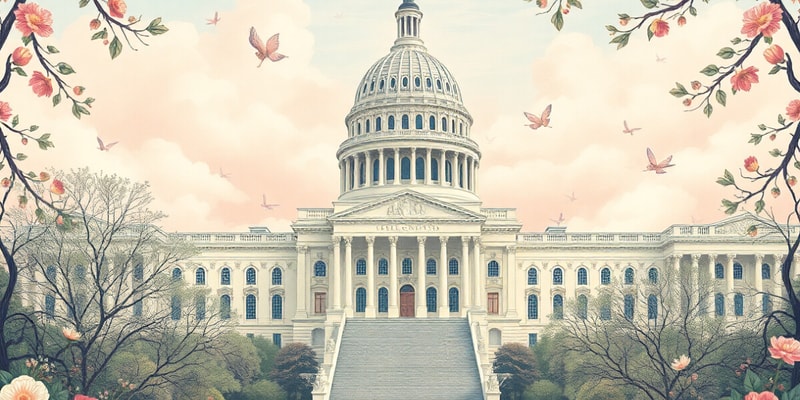Podcast Beta
Questions and Answers
Which party leader is the head of the majority party in the Senate?
What is the responsibility of the Vice President in the Senate?
What is the primary function of the House Rules Committee?
What distinguishes select (special) committees from standing committees?
Signup and view all the answers
What role does congressional oversight play in relation to agency rule-making?
Signup and view all the answers
What is a key difference between joint committees and standing committees?
Signup and view all the answers
Which entity is responsible for confirming presidential nominations according to the U.S. Constitution?
Signup and view all the answers
The term 'Advice and Consent' refers to which part of the congressional process?
Signup and view all the answers
What is the primary role of congressional committees?
Signup and view all the answers
What is the requirement for each congressional district in terms of population?
Signup and view all the answers
What happens to party members with poor relationships with their leadership regarding committee assignments?
Signup and view all the answers
What is the consequence of gerrymandering on electoral processes?
Signup and view all the answers
Study Notes
The Legislative Branch
- Article I of the US Constitution established a bicameral legislature, Congress.
- Congress is made up of two chambers: the Senate and the House of Representatives.
- Each chamber has different requirements, responsibilities and constituents.
The Senate
- The Senate has 100 members.
- Senators serve 6-year terms with no limits.
- Each state has two senators.
- One-third of the Senate is up for reelection every two years.
- The minimum age to serve in the Senate is 30.
- The Senate is led by the Majority Leader, currently Chuck Schumer.
- The Vice President of the United States presides over the Senate and votes in the case of a tie.
- In the Vice President’s absence, the President Pro Tempore presides.
The House of Representatives
- The House of Representatives has 435 members.
- Representatives serve 2-year terms with no term limits.
- All members are up for reelection every 2 years.
- The minimum age to serve in the House is 25.
- The House of Representatives is based on population.
- Each state has a number of seats in the House of Representatives proportional to its population.
- The House of Representatives is organized geographically with equal population in each district.
- The House of Representatives is led by the Speaker of the House, currently Mike Johnson.
- The Speaker of the House is third in line to succession of the presidency.
Leadership in Congress
- The majority party in each chamber of Congress elects its leaders.
- In the 118th Congress, there are 47 Democrats, 49 Republicans, and 4 independents in the Senate.
- In the 118th Congress, there are 211 Democrats, 220 Republicans, and 4 vacancies in the House.
Congressional Districts
- The Permanent Apportionment Act of 1929 permanently set the maximum number of representatives at 435.
- Reapportionment is the process of reallocating all 435 seats in the House of Representatives based on population.
- Redistricting is the process of dividing states into districts.
- The states are responsible for redistricting.
- Each district must have approximately the same number of people.
Gerrymandering
- Gerrymandering is the process of intentionally drawing district boundaries to favor a particular political party.
Congressional Committees
- Congressional committees are small groups oriented around policy or procedural issues where the real work of Congress gets done.
- Committee assignments are determined by the majority party leadership in each chamber.
- Committees are classified into several types:
- Standing Committees: Permanent committees responsible for a particular policy area.
- House Rules Committee: The committee that determines how and when debate on a bill will take place.
- Select (Special) Committees: Committees appointed to deal with an issue or problem not suited to standing committees.
- Joint Committees: Committees made up of members from the House and the Senate.
- Conference Committee: Committee formed to reconcile differences in the House and Senate versions of a bill.
Roles of Congress
- Congressional Oversight: The efforts of Congress, through committees, to monitor agency rule-making, enforcement and implementation of congressional policies.
- Impeachment: A formal charge by the House on the president (or other members of the executive branch) for “treason, bribery, or other high crimes, misdemeanors” which may result in removal from office. The House votes to impeach and the Senate votes to convict.
- Advice and Consent: The president "shall nominate, and by and with the Advice and Consent of the Senate, shall appoint Ambassadors, other public Ministers and Consuls, Judges of the Supreme Court, and all other Officers of the United States, whose Appointments are not herein otherwise provided for." (Article II, section 2).
Studying That Suits You
Use AI to generate personalized quizzes and flashcards to suit your learning preferences.
Related Documents
Description
Explore the workings of the Legislative Branch of the United States government as established in Article I of the Constitution. This quiz covers the composition, terms, and leadership of both the Senate and the House of Representatives.




